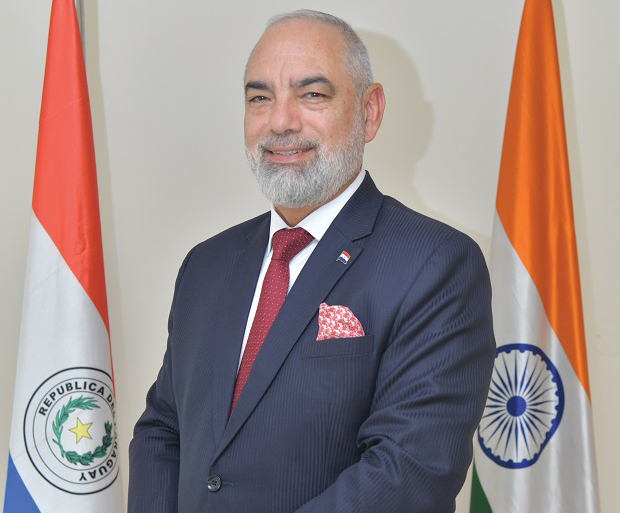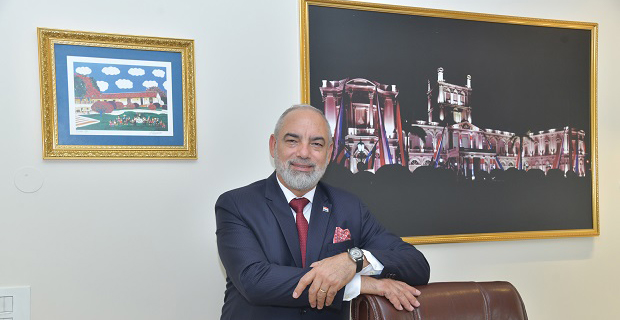“Strategic Partners, Shared Aspirations”
As Latin America takes on greater significance in India’s foreign policy, Paraguay is emerging as a vital gateway for deeper engagement with the region. In this exclusive and timely conversation, H.E. Mr. Fleming Duarte, Ambassador of Paraguay to India, speaks with India Empire’s Editor and Publisher Sayantan Chakravarty and Business and Diplomatic Editor Yogesh Sood on the eve of President Santiago Peña’s first State Visit to India, scheduled from June 2, 2025. Ambassador Duarte discusses the visit’s objectives, the shared values uniting both democracies, and the strategic opportunities that lie ahead for bilateral cooperation in trade, energy, education, and cultural exchange.

Bilateral trade between Paraguay and India has been growing steadily, especially in sectors like agricultural exports and pharmaceuticals. What new commercial or investment opportunities are being explored during this visit?
During this visit, both sides are actively exploring new and promising commercial opportunities that reflect Paraguay’s strengths and India’s evolving needs. Trade between the two countries has grown steadily in recent years, especially in agricultural commodities and pharmaceuticals, but there remains significant untapped potential.
Key areas of opportunity being discussed include:
- Agro-industrial investments in high-demand sectors such as edible oils, soy and processed foods, textiles, biofuels, where Paraguay offers high-quality exports and scope for value-added production.
- Expansion of biofuel exports, particularly ethanol, alongside technology transfer partnership, to enhance sustainable energy collaboration.
- Development of IT-enabled services, including business process outsourcing (BPO) and contact centers, leveraging Paraguay’s young, tech-savvy, and multilingual workforce—more than 300,000 Paraguayans speak Portuguese, enabling regional service integration.
- Investment in manufacturing, especially textiles and auto components, under Paraguay’s favorable Maquila and free trade regimes that offer significant cost and tax advantages.
- Renewable energy collaboration, capitalizing on Paraguay’s surplus hydroelectric capacity from sources such as the Itaipú and Yacyretá dams to power green industrial zones and reduce the carbon footprint of Indian enterprises operating in the region.
Together, these sectors offer a strategic blueprint for a deeper economic partnership that brings tangible benefits to both nations and builds long-term commercial resilience.
Given Paraguay’s strengths in clean energy and agriculture, and India’s expertise in IT and pharmaceuticals, are there specific sectors where the two nations are considering joint ventures or technology transfers?
Absolutely. There are several promising sectors for joint ventures and technology transfers between Paraguay and India, leveraging each country’s strengths and complementarities. Key areas include:
Biofuel Production: India’s extensive experience in ethanol blending technology can greatly complement Paraguay’s strong bioethanol production capacity as well as more than 40 years of public policy reaching more than 27% of blending and more recently a new law has approved 10% blending on Diesel. This collaboration could enhance biofuel output, improve sustainability, and contribute to energy security for both nations. Paraguay is a founding member of the Global Biofuels Alliance.
Agro-processing and Food Technology: By combining Paraguay’s agricultural strengths with India’s expertise in food processing, both countries can boost value-added agricultural exports, improving product quality and market reach globally.
Pharmaceutical Manufacturing: Paraguay’s favorable conditions, such as low production costs and abundant renewable energy resources, make it an attractive destination for pharmaceutical manufacturing. Indian pharmaceutical firms could benefit from technology transfers and joint manufacturing ventures, facilitating cost-effective production for regional and international markets.
IT and BPO Services: Paraguay’s young, multilingual workforce and its growing service sector with fresh start-ups offers significant opportunities for Indian IT and business process outsourcing companies to establish or expand operations in South America. This would also help Indian firms leverage Paraguay’s strategic geographic location within the MERCOSUR economic bloc.
Electric Vehicle (EV) and Auto Parts Manufacturing: Under MERCOSUR-linked regional agreements, there is potential for collaboration in electric vehicle production and auto parts manufacturing. Indian companies can explore partnerships with Paraguayan firms to tap into emerging regional markets and contribute to sustainable transportation initiatives.
Overall, these joint ventures and technology transfers align well with both countries’ economic priorities, fostering deeper bilateral ties and mutually beneficial growth.
Is there any discussion around a bilateral trade agreement or investment protection framework between India and Paraguay to boost investor confidence and facilitate smoother trade?
Yes, this visit will mark a milestone in bilateral trade and is expected to open a new chapter in institutional economic engagement between India and Paraguay. While no formal agreement has been signed yet, both sides are actively laying the groundwork for structured frameworks that will promote long-term commercial confidence and simplify cross-border operations.
Key areas under consideration include:
- Bilateral trade facilitation mechanisms to streamline regulatory procedures, reduce transaction costs, and promote smoother market access for both Indian and Paraguayan goods.
- Investment protection frameworks that will provide legal assurances for Indian investors in Paraguay, reinforcing the country’s image as a stable, reliable, and business-friendly destination.
- Customs cooperation agreements aimed at improving transparency, reducing clearance times, and enhancing the efficiency of trade logistics.
These proposed frameworks would build on Paraguay’s already favorable investment climate, characterized by competitive tax structures, investor-friendly labor regulations, and a stable macroeconomic environment. By advancing these discussions, both governments will seek to boost confidence among Indian businesses evaluating long-term industrial, infrastructure, and technology projects in Paraguay. This aligns closely with India’s broader push to expand secure and diversified supply chains and deepen trade links with Latin America.











Comments.